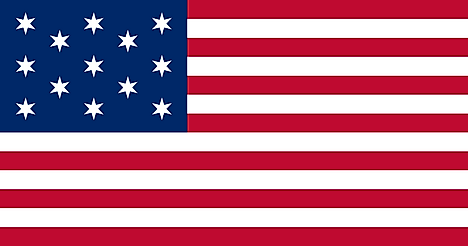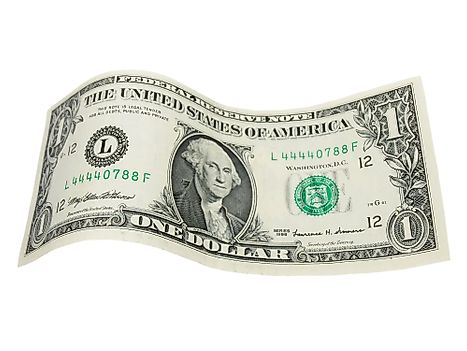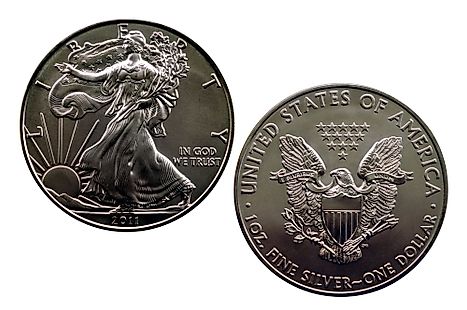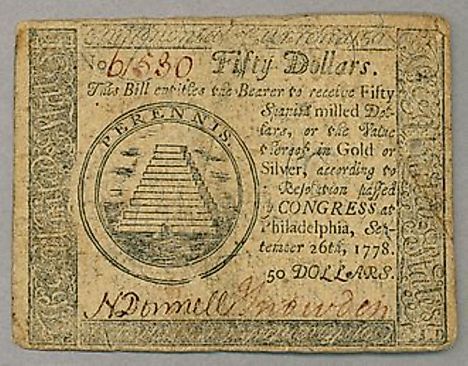Flags, Symbols & Currency of United States

The National Flag of the United States of America was officially adopted on July 4, 1960. The 50-star version of the flag was designed by Robert G. Heft.
The National Flag of the United States of America features 13 equal horizontal stripes of red (top and bottom) alternating with white stripes. There is a blue rectangle in the upper hoist-side corner bearing 50 small, white, five-pointed stars arranged in nine offset horizontal rows of six stars (top and bottom) alternating with rows of five stars. The blue color of the flag stands for loyalty, devotion, truth, justice, and friendship. The red color of the flag symbolizes courage, zeal, and fervency. The white color of the flag denotes purity and rectitude of conduct. The 13 stripes on the flag represent the 13 original colonies while the 50 stars represent the 50 states of the USA. The flag has a width-to-length proportion ratio of 10:19.
History of the Flag of USA
The United States flag is associated with rich American history and has changed appearance several times. While nobody is certain who made the first official flag, historians do know that during the Revolutionary War, different militias fought under different flags. These first flags ranged from a rattlesnake with the slogan, “Don’t Tread on Me,” to a pine tree with the phrase, “An Appeal to Heaven.” The idea of a national flag did not become an issue until Congress created the Continental Army in June of 1775 and George Washington flew the Continental Colors flag. The Continental Colors flag is believed to have had red and white stripes with the British Union Jack symbol, from the British national flag, in the upper left corner.
Perhaps then, George Washington or Congress realized that flying a British symbol while seeking independence from England was not the best way to unite the newly forming country. On June 14, 1777, the Continental Congress passed the first Flag Resolution. It stated that the national flag would contain 13 alternating red and white stripes with a blue field in the upper left-hand corner. The blue field was to contain 13 white stars and represent a new constellation, a symbol for the new country. The number 13 was significant because it was the number of the first colonies. The first flag was made by Betsy Ross. After the American Revolutionary war, additional states joined the Union, and the flag was adopted to reflect these changes. By 1794, two new states had joined, and Congress changed the description of the national flag to include 15 stripes and 15 stars. From 1794 until 1817, at least 4 more states had been added to the country. The flag, however, stayed the same until 1818 when Congress decided that the flag should have 13 stripes to honor the 13 original colonies and a white star to represent each state in the Union. Thus, from 1777-1960, several acts were passed by Congress for the change of shape, design, and arrangement of the flag and for the addition of stars and stripes.
Symbols of United States
The National Coat of Arms/ Great Seal of United States

The Great Seal of the United States of America consists of a central shield that bears the colors of the national flag. The shield is supported by a bald eagle with outstretched wings. In its left talons, the eagle holds a bundle of 13 arrows and in its right talons, the eagle holds an olive branch. The head of the eagle is turned towards the right side to face the olive branch, symbolizing peace. A scroll is clutched by the eagle in its beak, which displays the motto: E pluribus unum (“Out of Many, One”). Above the eagle’s head a glory is placed. It contains 13 stars (mullets) arranged on a blue background.
National Motto
"In God We Trust"
National Anthem
- Anthem Title: "The Star-Spangled Banner"
- Music Composer: John Stafford Smith
- Lyricist: Francis Scott Key
- Date of Adoption: March 3, 1931.
"The Star-Spangled Banner" is the official national anthem of the United States of America as well as all the overseas territories of the US. The music of the anthem have been composed by John Stafford Smith and the lyrics of the anthem have been authored by Francis Scott Key. The anthem was officially adopted as the national anthem on March 3, 1931. There are total 4 verses in the anthem, only the first verse is usually sung.
"The Star-Spangled Banner"
1.
Oh, say can you see by the dawn’s early light
What so proudly we hailed at the twilight’s last gleaming?
Whose broad stripes and bright stars thru the perilous fight,
O’er the ramparts we watched were so gallantly streaming?
And the rocket’s red glare, the bombs bursting in air,
Gave proof thru the night that our flag was still there.
Oh, say does that star-spangled banner yet wave
O’er the land of the free and the home of the brave?
2.
On the shore, dimly seen through the mists of the deep,
Where the foe’s haughty host in dread silence reposes,
What is that which the breeze, o’er the towering steep,
As it fitfully blows, half conceals, half discloses?
Now it catches the gleam of the morning’s first beam,
In full glory reflected now shines in the stream:
‘Tis the star-spangled banner! Oh long may it wave
O’er the land of the free and the home of the brave.
3.
And where is that band who so vauntingly swore
That the havoc of war and the battle’s confusion,
A home and a country should leave us no more!
Their blood has washed out of their foul footsteps’ pollution.
No refuge could save the hireling and slave
From the terror of flight and the gloom of the grave:
And the star-spangled banner in triumph doth wave
O’er the land of the free and the home of the brave.
4.
Oh! thus be it ever, when freemen shall stand
Between their loved home and the war’s desolation!
Blest with victory and peace, may the heav’n rescued land
Praise the Power that hath made and preserved us a nation.
Then conquer we must, when our cause it is just,
And this be our motto: “In God is our trust.”
And the star-spangled banner in triumph shall wave
O’er the land of the free and the home of the brave.
The Currency of United States is the United States dollar
The current official currency of the United States is the United States dollar ($, USD). The dollar derives its strength from the economic and political might of the USA and is undoubtedly the most powerful currency in the world. Globally, the US dollar is the foremost reserve currency along with the euro and Special Drawing Rights (SDR).
The US has a decimal currency system. The base unit of the currency is a dollar, which is made up of 100 cents. One cent is also known as a penny.
Coins
Currently, coins in denominations of 1¢, 5¢, 10¢, 25¢, 50¢, and $1 are in circulation. the coins are minted by the US Mint.
A penny (One cent) is a copper-plated zinc coin. It has Abraham Lincoln, the 16th US President, on one side, and the Lincoln Memorial on the other side. The five-cent coin is called a nickel. In size, a nickel is larger than a penny. It has Thomas Jefferson, the 3rd US President, and Monticello (Jefferson's home) on either side. The ten-cent coin is called a dime. It is smaller in size than the penny and the nickel. Franklin Delano Roosevelt, the 32nd US President is on one side of the dime, and there are an Olive Branch, a Torch, and an Oak Branch on the other side. The twenty-five cent coin is called a quarter. The size of a quarter is larger than that of a nickel. A quarter has George Washington, the 1st US President, on one side. The other side either has a United States emblem (eagle) or a design of one of the fifty states of the US. A half-dollar coin is worth fifty cents. It is a silver-coated copper coin. The coin’s one side has John F. Kennedy, the 35th US president. The other side has The Presidential Seal. The US also has a one-dollar coin. It is golden in color and is made up of a manganese and brass alloy. The dollar coin features Sacagawea, a Native American heroine, on one side, and a Soaring bald Eagle and 17 Stars on the other. Every US coin has two phrases. The first phrase is ‘E Pluribus Unum’, meaning ‘Out of Many, One,’ and the second phrase is "In God we trust."
Banknotes
US banknotes come in the denominations of $1, $2, $5, $10, $20, $50 and $100. Larger denominations, such $500, $1,000, $5,000 and $10,000 dollar bills, are no longer printed. The paper currency is printed by the Bureau of Engraving and Printing (BEP).
The most instantly recognizable paper money in the world is the US one dollar banknote. It features George Washington, the first US president, on the front side, and the pyramid and the eagle, which together constitute the Great Seal of the United States, on its backside.
Historical Currencies of United States
The history of the currency of the United States is more than 240 years. In 1775, the Continental Congress of the United States started to issue the Continental Currency. On April 2, 1792, the United States dollar was created by the United States Congress as the standard currency of the country. The Coinage Act of 1792, put together an organized monetary system that had introduced gold, silver, and copper coins. To finance the Civil War in 1861, Paper notes (greenbacks) were issued. The US dollar was initially used to be pegged to gold reserves. After that, it was exchanged as a paper note which was redeemable in gold. In 1971, US President Richard Nixon broke the link between the dollar and gold, and the dollar's value was permitted to float based on market conditions.
















